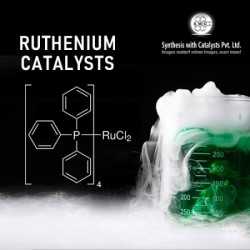Ruthenium catalysts are a type of catalyst that contains ruthenium, a transition metal, as the active component. These catalysts are widely used in organic synthesis and industrial processes due to their ability to accelerate chemical reactions and increase reaction selectivity.
Ruthenium catalysts can exist in various forms, including complexes, nanoparticles, and supported catalysts. They are known for their high activity, stability, and versatility, and are used in a ra...Read more
Ruthenium catalysts are a type of catalyst that contains ruthenium, a transition metal, as the active component. These catalysts are widely used in organic synthesis and industrial processes due to their ability to accelerate chemical reactions and increase reaction selectivity.
Ruthenium catalysts can exist in various forms, including complexes, nanoparticles, and supported catalysts. They are known for their high activity, stability, and versatility, and are used in a range of reactions, including hydrogenation, oxidation, and metathesis.
One of the most significant advantages of ruthenium catalysts is their ability to catalyze difficult reactions that are not easily achieved with other catalysts. For example, they can facilitate the formation of carbon-carbon bonds and allow for selective functionalization of complex molecules.
Ruthenium catalysts are also used in the production of fine chemicals, pharmaceuticals, and polymers. They have been shown to be effective in various fields, including energy storage and conversion, and have the potential to play a significant role in the development of sustainable technologies.
Overall, ruthenium catalysts are an important class of catalysts that offer a range of advantages in chemical synthesis and industrial processes, making them a valuable tool for researchers and industrial chemists.
Contact us on axayrp@gmail.com or visit our website https://www.synthesiswithcatalysts.com/.
Read less









